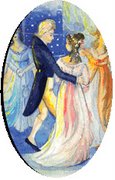
I have been bombarding myself with ‘Downton Abbey’ lately, including the basic circumstances that required Lord Grantham to invite Matthew Crawley to Downton (because his previous heir died during the Titanic accident, God bless their souls). I then remembered how similar things still were in 1912 with early 19th century when Jane Austen wrote Sense & Sensibility and Pride & Prejudice. Just take a look at a paragraph from SS Chapter 1 Volume 1:
The old Gentleman died; his will was read, and like almost every other will, gave as much disappointment as pleasure. He was neither so unjust, nor so ungrateful, as to leave his estate from his nephew; - but he left it to him on such terms as destroyed half the value of the bequest. Mr Dashwood had wished for it more for the sake of his wife and daughters than for himself or his son:- but to his son, and his son’s son, a child of four years old, it was secured, in such a way, as to leave to himself no power of providing for those who were most dear to him, and who most needed a provision, by any division of the estate, or by any sale of its valuable woods.
Thus Mrs Dashwood and the girls had to leave Norland, but thankfully not without meeting Edward Ferrars first (at least for Elinor’s sake).
And of course, in PP, we have Mr Collins, who, as Mr Bennet said in Chapter 13 Volume 1, “…when I am dead, may turn you all out of this house as soon as he pleases” to which his dear wife replied with “Oh! my dear…I cannot bear to hear that mentioned. Pray do not talk of that odious man. I do think it is the hardest thing in the world that your estate should be entailed away from your own children; and I am sure if I had been you, I should have tried long ago to do something or other about it.”
All of these conversations gave me a very strong desire to understand why the entail had to be designed as such to put women in such a disadvantage situation. I think it has been enacted since early 13th century. Pemberley has a link about an entail, including a very complicated Male Primogeniture Succession that explained that any entailed properties were inherited by the nearest male-line descendant (instead of female line).
My primary question is, is it still happening? If not, when did it cease? If it is, I cannot believe it. England is a modern country after all, now. But… even in Indonesia, inheritance is given to the eldest son, not daughter, until now. So why am I still surprised?
Rachel &c, care to explain it to me?
Pic: Norland Estate, from Jane Austen's World
















































